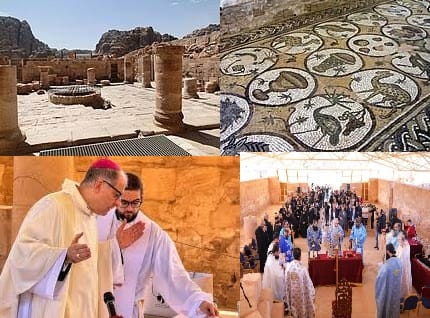
Previous Ultra-Orthodox Jewish man seen spitting at Christian priest in Jerusalem

by Rula Samain
Petra Church is poised to become a prominent destination for Christian pilgrimage. This development is deemed significant for several reasons, notably due to its strategic focus on leveraging our rich cultural and historical heritage to enhance the tourism sector at both local and global levels.
The Petra Church holds a special place in my career journey, as I had the privilege of covering this unique archaeological site for The Jordan Times in 2013, highlighting its significance and beauty.
I learned about the Petra Church during an international seminar attended by distinguished figures. Among them was the renowned Italian archaeologist Franco Sciorilli, who graciously shared insights regarding the Byzantine church discovery he and his team were excavating.
He informed us about a church dating back to 450 AD. A significant structure was constructed atop the remnants of Nabatean and Roman ruins, thereby deepening its historical importance. Sciorilli also presented images of a cohesive mosaic piece measuring 70 square meters, situated in each of the side aisles. These mosaics depicted personifications of the seasons, the ocean, the earth, and wisdom, indicating the rarity of the discovery.
Petra Church was first discovered in 1990 by the archaeologist Kenneth Russell. The truth is that this Byzantine archaeological site is not just an ordinary church; it is a full-fledged cathedral.
Normally, cathedrals are larger than a regular church both in terms of space and in ecclesiastical status, referred to as the bishop, and suggests that it is situated in a thriving city, as history accounts of Petra civilization during the Byzantine era. A cathedral is normally surrounded by at least ten churches.
At the time, associate director of the American Centre of Oriental Research (ACOR), Christopher Tuttle, said that the exploration of the cathedral extends beyond its discovery, as its true significance lies in finding 152 scrolls of charred papyrus hidden inside one of the cathedral’s chambers. The findings survived the fire that took place in 600AD destroying most of its features and causing the papyri to carbonize, and, ironically, be preserved.
In 1993, during the Christmas holiday, archaeologists were preparing to leave. Still, due to challenging weather conditions, they took refuge inside one of the church’s rooms, where they discovered a burned material — carbonized scrolls survived against all odds, making this discovery all the more remarkable.
This discovery was considered an archaeological breakthrough since the papyrus scrolls are among the most important documentations of antiquity found outside of Egypt. It also provided archaeologists with remarkable insights into the Byzantine era in the 6th century AD.
The scrolls comprise the family archive of Theodoros, a member of the church elite, providing Byzantine legal records regarding the registration of property sales, and transfers of taxes, as well as listing the Greek, Latin, and Nabataean names of Petra’s inhabitants. The scrolls also unveil social, economic, and legal details of life in sixth-century Petra, providing a rich and unique window into the era, as informed by Barbra Porter, director of ACOR.
The continuous excavations unearthed more “chambers” that used to be part of the cathedral, and revealed that the Petra Church was the seat of the bishop at the time and was dedicated to the “Blessed and All-Holy Lady, the most Glorious Virgin Mary”.
In 1992 two more churches were discovered on the same hillside: The Blue Chapel and the Ridge Church.
Located a few hundred meters from the Street of Facades and the Winged Lion Temple, Petra Church represents an intriguing archaeological site and is considered an important Christian pilgrimage destination.
@Jordantimes
Rula Samain is a journalist and writer specializing in interfaith dialogue, peace, and reconciliation


تكافح مجلة “ملح الأرض” من أجل الاستمرار في نشر تقارير تعرض أحوال المسيحيين العرب في الأردن وفلسطين ومناطق الجليل، ونحرص على تقديم مواضيع تزوّد قراءنا بمعلومات مفيدة لهم ، بالاعتماد على مصادر موثوقة، كما تركّز معظم اهتمامها على البحث عن التحديات التي تواجه المكون المسيحي في بلادنا، لنبقى كما نحن دائماً صوت مسيحي وطني حر يحترم رجال الدين وكنائسنا ولكن يرفض احتكار الحقيقة ويبحث عنها تماشيًا مع قول السيد المسيح و تعرفون الحق والحق يحرركم
من مبادئنا حرية التعبير للعلمانيين بصورة تكميلية لرأي الإكليروس الذي نحترمه. كما نؤيد بدون خجل الدعوة الكتابية للمساواة في أمور هامة مثل الإرث للمسيحيين وأهمية التوعية وتقديم النصح للمقبلين على الزواج وندعم العمل الاجتماعي ونشطاء المجتمع المدني المسيحيين و نحاول أن نسلط الضوء على قصص النجاح غير ناسيين من هم بحاجة للمساعدة الإنسانية والصحية والنفسية وغيرها.
والسبيل الوحيد للخروج من هذا الوضع هو بالتواصل والنقاش الحر، حول هويّاتنا وحول التغييرات التي نريدها في مجتمعاتنا، من أجل أن نفهم بشكل أفضل القوى التي تؤثّر في مجتمعاتنا،.
تستمر ملح الأرض في تشكيل مساحة افتراضية تُطرح فيها الأفكار بحرّية لتشكل ملاذاً مؤقتاً لنا بينما تبقى المساحات الحقيقية في ساحاتنا وشوارعنا بعيدة المنال.
كل مساهماتكم تُدفع لكتّابنا، وهم شباب وشابات يتحدّون المخاطر ليرووا قصصنا.